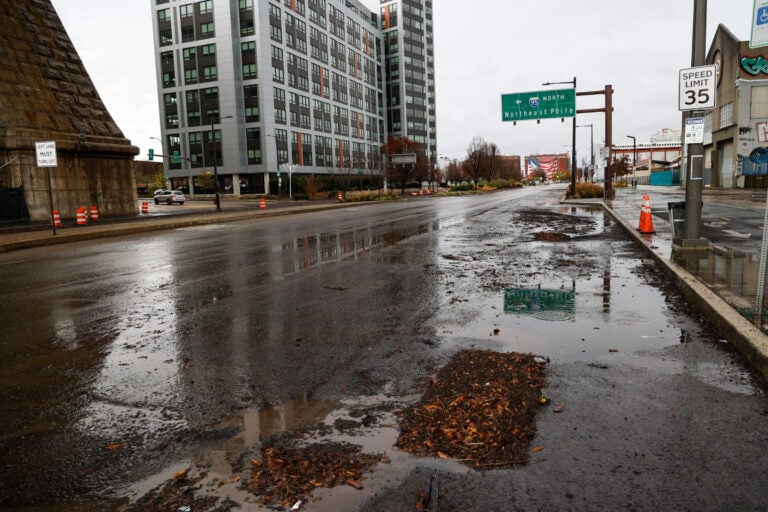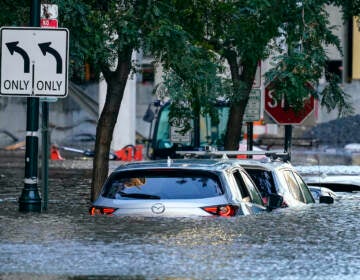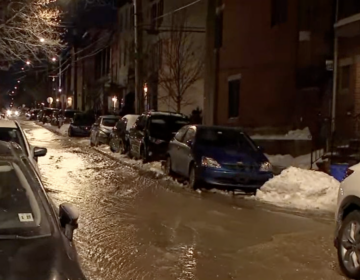Severe wind, rain and flooding expected in Philly region; ‘Hunker down,’ officials say
Several rivers are expected to see moderate to major flooding, and wind speeds could reach 65 miles per hour along the Jersey and Delaware coasts.
Listen 0:56
File photo: Debris sits on a closed Columbus Blvd. in Philadelphia after a storm brought heavy rain to the region and the Delaware River overflowed onto the road on December 18, 2023. (Kimberly Paynter/WHYY)
From Philly and the Pa. suburbs to South Jersey and Delaware, what would you like WHYY News to cover? Let us know!
Pennsylvania officials are urging drivers to “turn around, don’t drown” if faced with inundated roadways as a powerful winter storm continues to pelt the region with heavy rains. Overnight flooding is anticipated along with severe winds.
The heaviest rain is expected from 6 p.m. Tuesday through 2 a.m. Wednesday, according to the National Weather Service. Areas along the Delaware River, Delaware Bay, Jersey Shore and inland rivers in Southeastern Pennsylvania could flood Tuesday or Wednesday. Coastal areas of New Jersey and Delaware could experience wind gusts of up to 65 miles per hour Tuesday night.
“That could bring down trees,” New Jersey state climatologist David Robinson said on WHYY’s “Studio 2.” “The ground is soaked. … Trees are more susceptible to falling, and with that power lines can come down.”
New Jersey Gov. Phil Murphy declared a state of emergency starting at 5 p.m. Tuesday.
“We are expecting one to four inches of heavy rain, strong winds, and potential inland and coastal flooding,” Murphy said in a statement. “This storm will exacerbate the effects of the inclement conditions we experienced in December and this past weekend and may precede another storm Friday night. As always, I urge all New Jerseyans – including residents in our coastal and riverine communities – to follow all safety protocols and remain off the roads unless absolutely necessary.”
Experts recommend staying up-to-date with emergency weather alerts and avoiding walking into or driving through floodwaters.
“Hunker down,” Robinson said. “Stay off the roads. … Be prepared for a potential power outage — make sure the flashlights are ready and such. And if the winds get real strong, stay away from windows.”
People living in flood prone areas should consider moving cars to higher ground and raising valuables stored in basements or first floors.
Melting snow from the weekend storm & new rain forecast for much of PA today could create localized flooding across the commonwealth. Stay alert to water on the roadways, obey signs/detours, & never drive past barricades or through flooded roadways. #TurnAroundDontDrown #BeSafePA pic.twitter.com/vkxanjzcYR
— PA Department of Transportation (@PennDOTNews) January 9, 2024
FEMA also recommends making a family safety plan for extreme weather — and even practicing it — ahead of time.
“You have to take into account the age of your child, their capabilities, what you’re going to be able to do in that situation,” FEMA Regional Administrator MaryAnn Tierney told WHYY News in July.
Flash flooding can be deadly. This past summer, at least six people died when a roadway in Bucks County flooded suddenly, after a storm dumped more than a month’s worth of rain in hours.
As of Tuesday morning, the NWS forecasts that several rivers will see “moderate to major flooding,” particularly in North Jersey and Southeastern Pennsylvania, and that widespread flooding of urban areas and small streams is possible.
Waterways expected to hit moderate to major flood stage early Wednesday morning include the Delaware River in New Castle, Delaware and in South Philly, the Neshaminy Creek near Langhorne and Perkiomen Creek in Graterford.
In Philadelphia, flooding and road closures are possible on Delaware Avenue and Columbus Boulevard along the Delaware River and on Kelly and MLK drives along the Schuylkill River, said Office of Emergency Management spokesperson Jeffrey Kolakowski.
The agency recommends making sure that stormwater grates around your home and block are clear of debris and securing loose outdoor items.
#ReadyPhiladelphia alerts are an easy way to stay informed about severe weather and emergencies. Text READYPHILA to 888-777 or visit https://t.co/olEtFHtz2v. pic.twitter.com/sGBUq1LVxd
— Philadelphia OEM (@PhilaOEM) December 18, 2023
PECO is preparing its crews to respond to possible outages, according to a release sent out Tuesday morning. The company warns residents to avoid touching downed power lines, connecting generators directly to home wiring and using generators indoors.
PECO customers can report outages online and by text, by texting “ADDOUTAGE” to MYPECO (697326).
Human-caused climate change increases the risk of heavy rain, as a warmer atmosphere can hold more moisture. Development of surfaces that water runs off, rather than soaks into — like parking lots, roofs, and roads — also raises flood risk.

Get daily updates from WHYY News!
WHYY is your source for fact-based, in-depth journalism and information. As a nonprofit organization, we rely on financial support from readers like you. Please give today.







